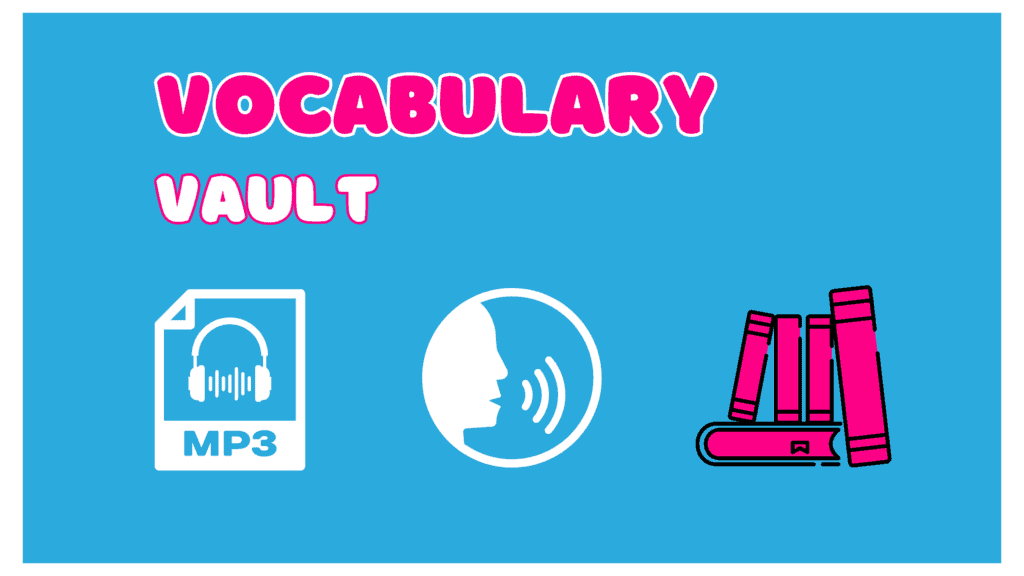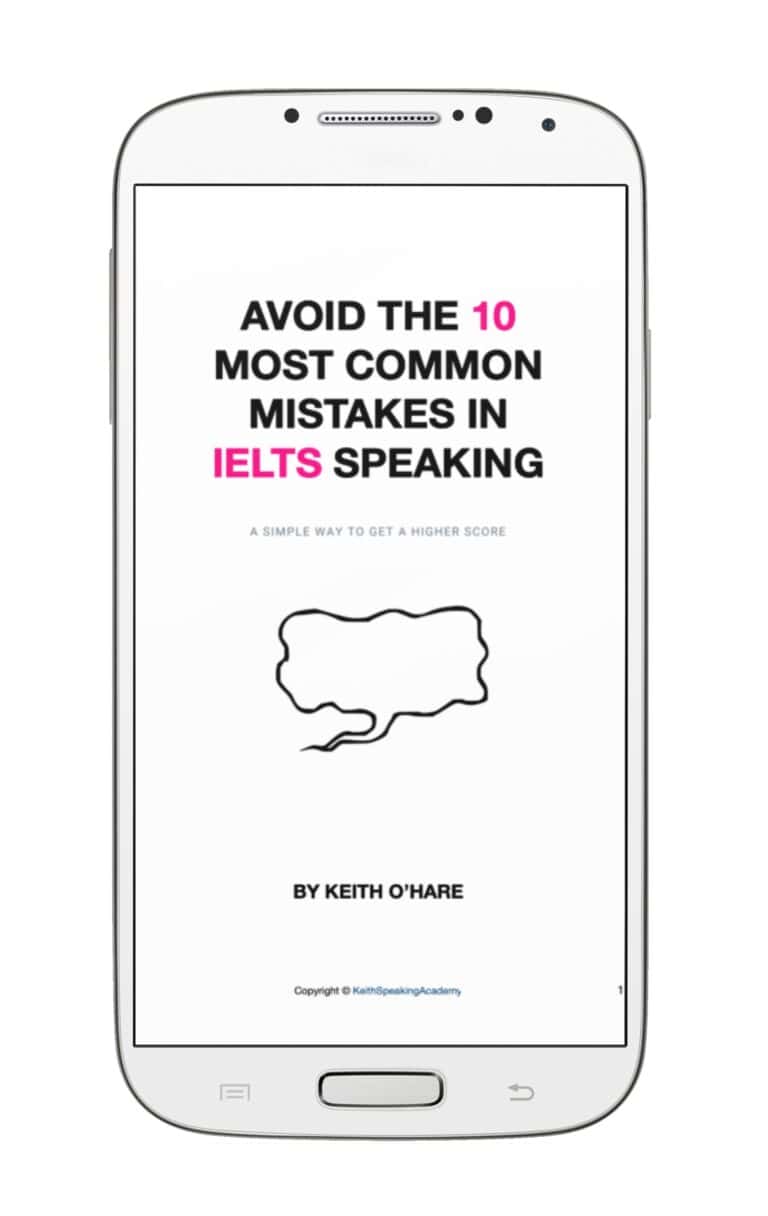IELTS Speaking Lesson about Habits
👇 Take this lesson with you! 👇
In IELTS Speaking the topic of HABITS, can come up in a lot of ares and different questions. For example, IELTS Speaking questions about hobbies, jobs, daily activities, doing exercise, recycling, productivity and so on.
In this lesson, we will look at the vocabulary and ideas you need to talk confidently on this topic.
Table of Contents
IELTS Speaking vocabulary: Habits
Here is some useful vocabulary to talk about the topic of habits in IELTS Speaking,
I tend to ____
I tend to get up early in the morning
I like to _____
I like to make my bed as soon as I have got up
Do something out of habit
I get up early everyday out of habit
I’m in the habit of _____
I’m in the habit of going for a walk every evening after walk.
It has become a habit
I go for a walk every evening now with my dog, it has become a habit.
Very often when talking about bad habits, we use the following:
- I have a habit of _____
- I have fallen into the habit of _____
In order to stop a habit, we might say,
I am trying to break / kick / give up this habit
Adjectives to describe habits
- Annoying, bad, nasty
- good, endearing
- smoking, drinking
She has an annoying habit of snoring
He has an endearing habit of always being optimistic
He is trying to kick his smoking habit

Adjectives to describe habits
Annoying, bad, nasty
good, endearing (=makes people like you)
smoking, drinking (and other drugs)
I need to kick my smoking habit
IELTS Speaking listening task 1
You are going to listen to someone talking about changing a bad habit.
Fill in the gaps with one or two words.
- There are ______ stages to changing a habit.
- If you see a ________ in your fridge, that can be a cue to take one
- Rewards give us a sense of ____________
- To change a habit, either you take the cue away or you _______ the routine
- Drinking beer might be a good way of relieving __________
Click arrow to open/close answers
- There are three stages to changing a habit.
- If you see a beer in your fridge, that can be a cue to take one
- Rewards give us a sense of satisfaction
- To change a habit, either you take the cue away or you change the routine
- Drinking beer might be a good way of relieving your boredom
IELTS Speaking listening task 2
Next, listen to the passage again and fill in the gaps.
Write your answers in the comments below:
If you want to change a habit, you help to know the three stages of every habit. The cue, the routine and the reward. First, you need to identify the [1] ______________.
For example, imagine you have [2] ___________ into the habit of drinking a couple of beers every evening when you get home form work. You are getting fatter and want to [3] ____________ the habit.
The cue might be a time, a [4] ___________, something you see, or maybe something someone says.
For example, you get home and think – ‘it’s 6pm, time for a beer!’
Or your wife, with all good intentions, says, “you’re home, fancy a beer?”
Perhaps, you open the [5] _______________ and see the nice, cold beers waiting for you, that’s the cue to take one and have a refreshing drink.
The routine is having the drink, and the reward is the satisfaction that drink [6] __________ you.
There are different things you can do to change this habit.
Two of the most common ones are
- remove the cue
- change the routine with something that gives the same reward
The first step could be to remove the cues. Hide the beers – out of sight, out of [7] ___________.
Another step could be change the routine with something that gives the same reward, but to do that you must know what the reward really is.
If having a drink breaks the boredom, you could replace it with watching a film on TV, or taking your dog for a walk.
If the reward is [8] ______________ your thirst, you could replace the drink with a different cold and refreshing drink.
What bad habit do you want to change, and how will you do it?
Based on ideas from articles about ‘Habits’ by James Clear

Click arrow to open/close answers
Answers
First, you need to identify the [1] cue.
For example, imagine you have [2] fallen into the habit of drinking a couple of beers every evening when you get home from work.
You are getting fatter and want to [3] kick the habit.
The cue might be a time, [4] a place, something you see, or maybe something someone says.
Perhaps, you open the [5] fridge and see the nice, cold beers waiting for you, that’s the cue to take one and have a refreshing drink.
The routine is having the drink, and the reward is the satisfaction that drink [6] gives you.
The first step could be to remove the cues. Hide the beers – out of sight, out of [7] mind.
If the reward is [8] quenching your thirst, you could replace the drink with a different cold and refreshing drink.
Idioms to talk about habits
- I am a creature of habit = I like routines
- I am a stickler for = I insist on certain things
- I am a stickler for getting up early
I am a stickler for doing exercise everyday
- Old habits die hard = it’s difficult to change a habit
- Why break the habit of a lifetime? = It’s not necessary to change that habit
- I am stuck in a rut = I’m stuck in a boring routine, in a bad situation.
- Keeping with tradition… = I will continue with my habit / tradition
Keeping with tradition, I will have roast turkey on Christmas Day this year
- Breaking with tradition… = not to continue a habit
I know I usually drink beer when I go to the pub, but today, breaking with tradition, I am going to have water!
- Practice what you preach = do the things you tell others to do
Pronunciation Files For Vocabulary From My Best Live Lessons
Use Words EASILY in English Conversations!
More Free IELTS Speaking Lessons
If you liked this lesson, leave a comment below!
There are more lessons you can follow in the links below too.
FRIENDS in IELTS Speaking Listening practice about friends and essential vocabulary to talk about your friends.
MOBILE PHONES in IELTS Speaking. Learn vocabulary of phones and ideas to talk about how we use phones in our lives.
SKILLS in IELTS Speaking. Learn the collocations and adjectives to talk about skills we learn and need.



1.cue
2.fallen
3.kick
4.place
5.fridge
1 Cue
2 Addicted
3 get rid of
4 thing
fridge
1 behaviour
2 run
3 give up
4 place
5 fridge
1 habit
2 fallen
3 kick
4 moment
5 fridge
1)the bad habitual action
2)fallen into
3)get rid of
4)place
5)fridge
1-Mainspring/ source
2-Fallen
3-Do away with
4-Spot / venue
5-Fridge
Habit
Fallen
Kick
A bear
Refrigerator
1.problem
2.fallen
3.stop
4.place
5.frdge
1.reason
2.fallen.
3.quite
5.place
5.fridge
habit
fallen
break
saying
fridge
1.bad habit
2.fallen
3.give up/break/kick
4.change
5.refrigerator
1.bad habit
2.fallen
3.kick up
4.place
5.fridge
Bad habit
Fallen
Leav
Someone
Fridge
bad habit
been
kick
reward
fridge
1.Cue
2.fallen into
3.kick /change/giving up
4. Place
5.fridge/cupbord/refrigerator
1) (bad)(annoying) habit
2) you have fallen into..
3) want to give up
4) a routine
5) fridge
1.cue
2.fallen
3.get rid of
4.change
5. fridge
Bad habit
Fallen
Leav
Someone
Fridge
1-5 answer is “The reward”
1. First, you need to identify the [1] the reward.
2. imagine you have [2]the reward into the habit of drinking a couple of beers every evening when you get home form work.
3. You are getting fatter and want to [3] reward the habit.
4. The cue might be a time, a [4] reward, something you see, or maybe something someone says.For example, you get home and think – ‘it’s 6pm, time for a beer!’ .
5. Perhaps, you open the [5] reward and see the nice, cold beers waiting for you, that’s the cue to take one and have a refreshing drink.
1 Reason
2 fallen
3 to go cold turkey
4 relaxing comfort in a glass of beer
5 cold storage
1. Cue
2. Fallen
3. Change
4. Place
5. Fridge
1. bad habit
2. fallen
3. break
4. place
5. fridge
1. bad habit
2. fallen
3. kick
4. place
5. fridge
Identify the cue
Gotten into
Break the habit
Location
Open the fridge
Bad habit
Fallen
Kick
Place
Fridge
1.habit
2. Fallen
3.kick
5.refrigerator
1. Bad habit
2. Been
3. Get rid of
4. Place
5. Refrigerator/fridge
Cue
Fallen
Give up
Place
Fridge
Habit
Fallen
Quit
Place
Refrigerator
1. Bad habit
2. Fallen
3. Quit
4. place
5. Refrigerator
1 Habit
2 gotten
3 quit
4
5 fridge